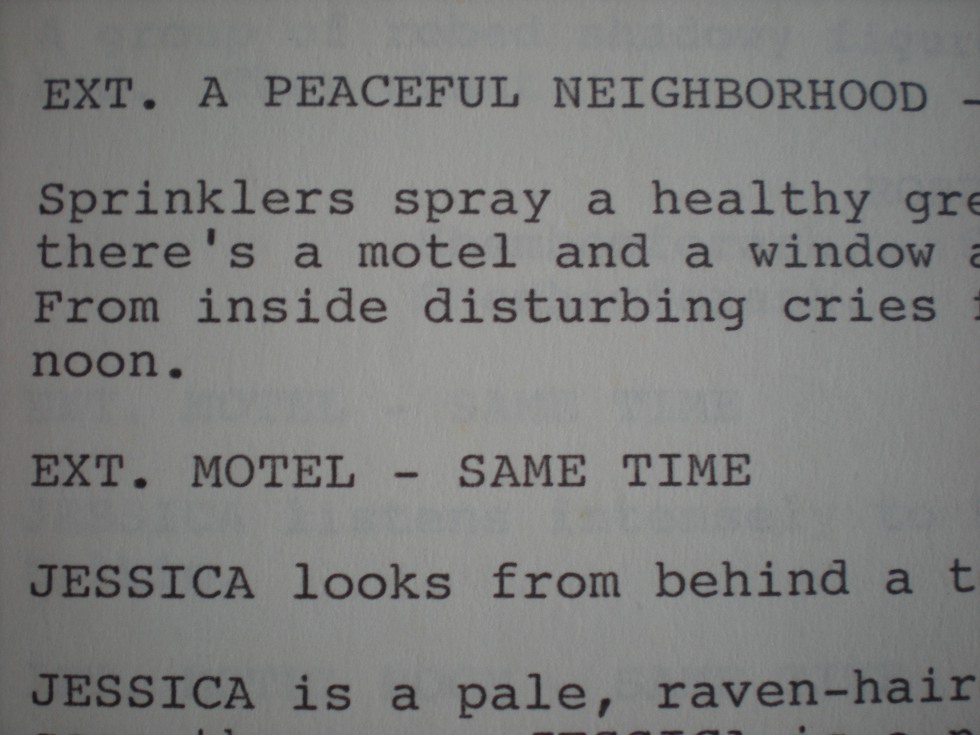UNITED STATES—The writer-director Everett Lewis called me up a week or so later and said he had read my screenplay. He said it was basically a mess, but his terms were much more genteel. Within that mess he saw the germ of something real in its treatment of Satan worshiping teens. I had touched on something that was truly happening and he wanted to work with me on it.
That’s really all it took to get me into the stratosphere—that phone call. Everett, like Larry Karaszewski before, educated me. At that first meeting at House of Pies, he handed me a packet of xeroxed pages with the first chapter of Robert Stone’s “Dog Soldiers” to show how characters are introduced and drawn indelibly from the get-go. I remember afterward, sitting atop Barnsdall Park on the green by the Frank Lloyd Wright house and reading this stuff and starting to soak it up. Sure I had twinges of despair: good grief, I had toiled enough on this lousy script, already. A saner person might have let it drop. That is a particular quality of my genius, just squeak by to the next level and then be dragged ever upward thanks to an intelligent responsive reader and a bit of kismet.
It was fall. I remember that by the tawny golden cast of the sunlight that suffused the shortening afternoons during the three-month creation. We met at the Vagabond Inn Coffee Shop and Figueroa about once a week. Just the drive down in the dusking autumn afternoon was a pleasure. There was hope, there was a sense of movement. It was nice to see the students crossing the crosswalk on Jefferson and see them playing basketball on the courts—on my way to the Vagabond Inn, and think here I am working on a screenplay—doing the thing that first brought me to U.S.C.
In the window booth at the Vagabond we had free-wheeling conversations. That to me was the sign of the best collaboration, that two personalities could roam freely without being mired in the work at hand. I think that bodes the most creative soil and it didn’t hurt, either, that Everett seemed to take to my sense of humor. I was full of mirth and felt a safety net in my collaborator as we created the story’s direction—we would talk it out and I would have some indecipherable notes in my notebook mostly full of names and phone numbers of people looking for rooms to rent.
Everett was then teaching animation classes at Chapman University in Orange County. Afterward, he would drive to the Vagabond and drag his lanky body out of his vintage Galaxy 500 for our brainstorming sessions. He had a quiet ample intelligence, respected by friends like Hisham who had worked with him and Kevin Greutert, who did some editing. He knew film, art and architecture in depth and subtly applied his heart and knowledge to the cinema. He appreciated surf culture, and one of the first things we did would shift the action from an Oklahoma oil town to Southern California.
There at the window booth in the Vagabond we would cook up the story elements, then I would immediately boogie back to the stuffy room at Manhattan Place. (The direction we were taking the story was so right that I rarely had to read my notes). In no time I had seven new pages on the Brother Word Processor. Everett added magic touches (like the utensils on a diner counter that change position pointing the waitress girlfriend to seek out her injured boyfriend at the hospital). He pushed me to do research, like finding some real mumbo jumbo from a witchcraft book.
I loved his mantra, “We want to create a freight train that nobody can get off of.” It influences me still.
When the work is going well, life is OK. It’s going a heck of a lot better than OK. And never have I felt more charitably disposed toward the human condition than during this stage of the “Strawberry Butterfly.”
Everett taught me how not to jump around. How necessary it is in cinema to take the viewer down the pathway: If you see somebody get into a car, show them getting out. It may see really simple, nevertheless it’s a lesson that I learned to apply to writing. Sometimes the most banal sentences infuse a fullness of understanding otherwise impossible to convey.
Grady Miller is a humorist. His latest humorous fiction collection, “Later Bloomer” is available on Amazon Kindle.






